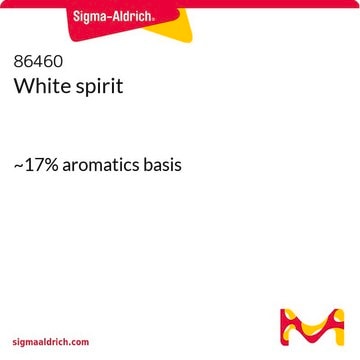31277
Cobalt(II) chloride hexahydrate
puriss. p.a., ACS reagent, reag. Ph. Eur., 98-102%
Sinónimos:
Cobaltous chloride hexahydrate
About This Item
Productos recomendados
grade
ACS reagent
puriss. p.a.
Quality Level
agency
reag. Ph. Eur.
vapor pressure
40 mmHg ( 0 °C)
assay
98-102%
form
solid
impurities
≤0.01% water-insoluble matter
anion traces
nitrate (NO3-): ≤100 mg/kg
sulfate (SO42-): ≤50 mg/kg
cation traces
Ca: ≤50 mg/kg
Cu: ≤20 mg/kg
Fe: ≤50 mg/kg
K: ≤50 mg/kg
Mg: ≤10 mg/kg
Mn: ≤50 mg/kg
Na: ≤100 mg/kg
Ni: ≤500 mg/kg
Pb: ≤5 mg/kg
Zn: ≤25 mg/kg
SMILES string
O.O.O.O.O.O.Cl[Co]Cl
InChI
1S/2ClH.Co.6H2O/h2*1H;;6*1H2/q;;+2;;;;;;/p-2
InChI key
GFHNAMRJFCEERV-UHFFFAOYSA-L
¿Está buscando productos similares? Visita Guía de comparación de productos
General description
Application
- To convert various aldoximes into corresponding nitriles in the presence of an inorganic base.
- To prepare organic-inorganic polyvinylidene fluoride nanofiber composites (PVDF/CoCl2) for the production of pure hydrogen production from NaBH4.
It can also be used as a cobalt precursor to synthesize nickel-cobalt-based binary metal phosphide (NiCoP) hollow spheres, which are used for electrocatalysis and energy storage (supercapacitor) applications.
signalword
Danger
Hazard Classifications
Acute Tox. 4 Oral - Aquatic Acute 1 - Aquatic Chronic 1 - Carc. 1B Inhalation - Eye Dam. 1 - Muta. 2 - Repr. 1B - Resp. Sens. 1 - Skin Sens. 1
Storage Class
6.1D - Non-combustible acute toxic Cat.3 / toxic hazardous materials or hazardous materials causing chronic effects
wgk_germany
WGK 3
flash_point_f
Not applicable
flash_point_c
Not applicable
Certificados de análisis (COA)
Busque Certificados de análisis (COA) introduciendo el número de lote del producto. Los números de lote se encuentran en la etiqueta del producto después de las palabras «Lot» o «Batch»
¿Ya tiene este producto?
Encuentre la documentación para los productos que ha comprado recientemente en la Biblioteca de documentos.
Los clientes también vieron
Nuestro equipo de científicos tiene experiencia en todas las áreas de investigación: Ciencias de la vida, Ciencia de los materiales, Síntesis química, Cromatografía, Analítica y muchas otras.
Póngase en contacto con el Servicio técnico









